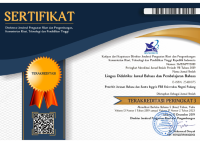EFL Students' Speaking Anxiety in Indonesian Senior High School
 ), Doris McDonald(4),
), Doris McDonald(4), (1) English Education Postgraduate Program, Universitas Negeri Makassar
(2) English Education Postgraduate Program, Universitas Negeri Makassar
(3) Universitas Negeri Makassar
(4) Northern Ilinois University
 Corresponding Author
Corresponding Author
Copyright (c) 2023 Lingua Didaktika: Jurnal Bahasa dan Pembelajaran Bahasa
DOI : https://doi.org/10.24036/ld.v17i1.121085
Full Text:
 Language : English
Language : English
Abstract
One of the essential abilities in learning English is speaking. However, most students believe that speaking English is challenging because they lack vocabulary and are reluctant to express their opinions. Anxiety is a mood that includes fear, hesitation, and worry about events both in the present and the future. This research aimed to find out the factors causing students’ speaking anxiety, the effects of students’ speaking anxiety, and the students’ strategies to reduce their speaking anxiety. The researchers applied a qualitative research design and used observations and interviews. The population of this study was 90 students in the first grade at SMAN 13 Pangkep Regency, and nine students interviewed by the researchers. The results show that two elements contributed to students’ speaking anxiety: linguistic issues (poor pronunciation, vocabulary, and ideas) and non-linguistic issues (lack of self- confidence, lack of preparation, shyness to their peers, and afraid of being laughed at). Speaking anxiety has two different effects on students’ speaking abilities: a facilitating influence that encourages them to talk and a debilitating effect that causes them to stutter, blank out, become afraid, or stumble. The students' use of preparation, avoidance of eye contact, and peer assistance helps them to reduce their speaking anxiety.
Keywords
References
Adamson, L. (2022). Fear and Shame: Students Experiences in English-Medium Secondary Classrooms in Tanzania. Journal Of Multilingual and Multicultural Development. 1-16
Alpert, R., & Haber, R. N. (1960). Anxiety in Academic Achievement Situations. The
Journal of Abnormal and Social Psychology, 61(2), 207–215.
Andrea, T. (2022). The Effect of Anxiety on Foreign Language Academic Achievement. Hungarian Educational Research Journal. 12 (2), 193–201
Bailey, K. M. (2006). Issues in Teaching Speaking Skills to Adult ESOL Learners.
Review of Adult Learning and Literacy, 6, 113–164.
Bragg, J. (2017). Communication Apprehension Among Community College Students: A Phenomenology. Johnson: East Tennessee State University
Brown, H. D. (1994). Principles of Language Learning and Teaching (3rd ed).
Englewood Cliffs, N.J: Prentice Hall Regents.
Burns, A., & Joyce, H. (1997). Focus on Speaking. Sydney: National Centre for
English Language Teaching and Research, Macquarie University.
Ferreira, R., & Murray, J. (1983). Spielberger’s State-Trait Anxiety Inventory:
Measuring Anxiety with and Without an Audience during Performance on a
Stabilometer. Perceptual and Motor Skills, 57(1), 15–18
Gregersen, T., & Horwitz, E. K. (2002). Language Learning and Perfectionism: Anxious and Non‐anxious Language Learners’ Reactions to Their Own Oral Performance. The Modern Language Journal, 86(4), 562–570.
Grieve, R, et al. (2021). Student fears of oral presentations and public speaking in higher education: a qualitative survey. Journal of Further and Higher Education. 45 (9). 1281-1293
Hakim, B, M. (2019). A Study of Language Anxiety among English Language Learners in Saudi Arabia. Arab World English Journal (AWEJ). 10 (1), 64-72
Hanifa, R. (2018). Factors generating anxiety when learning EFL speaking skills. Studies in English Language and Education, 5(2), 230-239.
Hasibuan, A. R., &Irzawati, I. (2020). Students’ speaking anxiety on their speaking performance: A study of EFL learners.
Horwitz, E. K., Horwitz, M. B., & Cope, J. (1986). Foreign Language Classroom
Anxiety. The Modern Language Journal, 70(2), 125–132.
Irzeqat, N. S. (2010). The Effect of Anxiety on the Oral Performance of Palestinian Students of English from the Perspectives of Teachers and Students. Hebron: Hebron University.
Kadir, H., &Salija, K. (2018). The Influence of Peer Groups on Students’ Anxiety in EFL Learning.ELT Worldwide,5(1), 54-62.
Kondo, D. S., & Ying-Ling, Y. (2004). Strategies for Coping with Language Anxiety:
The Case of Students of English in Japan. ELT Journal, 58(3), 258–265
Liu, M. (2005). Causes of Reticence in EFL Classrooms: A Study of Chinese
University Students. Indonesian JELT, 1(2), 108–124.
Liu, M. (2018). Understanding Chinese Middle School Students’ Anxiety in English Speaking Class. The Journal of Asia TEFL. 15 (3), 721-7. 34.
Lowe, P, A. (2019). Exploring Cross-Cultural and Gender Differences in Test Anxiety Among U.S. and Canadian College Students. Journal of Psychoeducational Assessment. 3 (7), 112-118.
McCroskey, J. C. (1978). Validity of the PRCA as an Index of Oral Communication
Apprehension. Communications Monographs, 45(3), 192–203.
Miles, M. B., Huberman, A. M., & Saldana, J. (2013). Qualitative Data Analysis.
California: SAGE Publications
Moreno, R. (2010). Educational Psychology. Hoboken, N.J: John Wiley & Sons.
Oxford, R. (1992). Who Are Our Students? A Synthesis of Foreign and Second
Language Research on Individual Differences with Implications for
Instructional Practice. TESL Canada Journal, 9(2), 30–49.
Oxford, R. L. (1999). Anxiety and the Language Learner: New insights. Affect in Language Learning, 58–67.
Oxford, R. L. (1999). Anxiety and the Language Learner: New insights. Affect in
Language Learning, 58–67.
Pollard, A. (2008). Reflective Teaching 3rd Edition: Evidence Informed Professional
Practice. (3rd ed). New York: Continuum International Publishing Group.
Saidi, M. (2015). The Impact of Students’ Anxiety on Oral Performance: first yearLMD students of English at Mohamed Khider University. Algeria: University of Biskra.
Sarwar, M., Alam, M., Hussain, A., Shah, A. A., &Jabeen, M. (2014). Assessing
English Speaking Skills of Perspective Teachers at Entry and Graduation
Level in Teacher Education Program. Language Testing in Asia a Springer
Open Journal, 14(5)
Scovel, T. (1978). The Effect of Affect on Foreign Language Learning: A Review of the
 Article Metrics
Article Metrics
 Abstract Views : 742 times
Abstract Views : 742 times
 PDF Downloaded : 216 times
PDF Downloaded : 216 times
Refbacks
- There are currently no refbacks.
Copyright (c) 2023 Lingua Didaktika: Jurnal Bahasa dan Pembelajaran Bahasa

This work is licensed under a Creative Commons Attribution-NonCommercial 4.0 International License.









